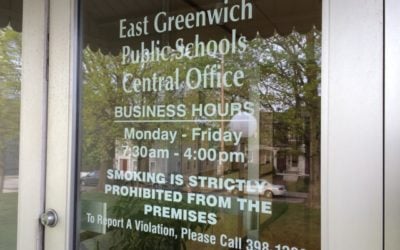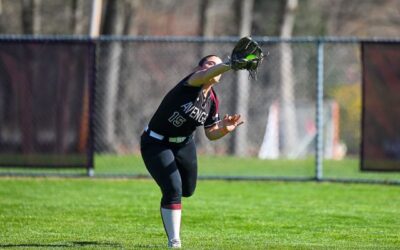Everything from mask wearing,
By Hope McKinney
Given the seemingly endless number of variables and situations that could arise in reopening schools due to COVID-19, Supt. Alexis Meyer convened a health and safety forum for parents Tuesday night, with medical professionals and school officials on hand to answer questions that had been submitted early.
 There were A LOT of questions.
There were A LOT of questions.
The panel on the virtual Zoom call included Meyer, Facilities Director Bob Wilmarth, several of the nurse-teachers (the district has one nurse per school building), district pediatric consultant Dr. Howard Silversmith, and EG parent Dr. Megan Ranney, an ER doctor at Rhode Island Hospital who has become a prominent national medical voice during the pandemic.
“We feel the same frustration when we can’t answer questions,” Superintendent Alexis Meyer said. “I acknowledge that and I empathize with all of you and all of us as we try to work through this.”
With President Donald Trump and his administration pressing for a reopening of schools with in-person learning, Dr. Silversmith said that he won’t be utilizing any of Trump’s guidelines when it comes to the safety and health of the students under the town’s care.
Dr. Silversmith emotionally highlighted the hard work of the school nurses within their district, urging everyone to be patient and kind.
“I think everybody has to realize how special you guys have it in East Greenwich with a superintendent and with school nurses who care about your kids,” he said, tears springing to his eyes. “You guys have school nurses and a superintendent who have worked every single day over the summer for your kids to be in school. I hope you appreciate them as much as I do.”
More than one question referenced Gov. Gina Raimondo’s recent decision to decrease the social gatherings limit to 15 people, noting the contradictory idea of reopening schools with a much larger crowd. Dr. Silversmith said he believes Gov. Raimondo’s intent with the action of decreasing the social gathering limit is actually a tactic to make it easier for schools to reopen. By working hard to decrease cases during the summer, this will hopefully allow for a safer reopening come the first day of classes.
Many questions addressed conditions that may conflict with measures put in place for the safety of schools. For example, wearing a mask may cause some students to feel anxious or like they’re having trouble breathing. Dr. Silversmith emphasized that he doesn’t think there are any medical conditions where you can’t wear a mask, even asthma. However, he acknowledged that some students may feel an anxious sensation when wearing a mask and considered how to work against this. He urged parents to begin now having their children wear their masks more often for longer durations to get them used to it. Mask breaks or distance learning for students in instances that are too intense can be considered.
Although there will be another forum focused on social and emotional health, Dr. Silversmith spent a little time on the topic Tuesday.
“We fully understand the social-emotional consequences of your kids not being in school the way they’re used to,” he said. “If your child has anxiety or depression, we want them in school. We want to be there for them. But we have to weigh the consequences of unmitigated spread. Talk to your children every day, ask how they’re doing, ask how their friends are doing. Talk to their pediatrician.”
You can watch the whole forum here:
For kids who have asthma, Dr. Silversmith said that spacers and inhalers are fine, but nebulizers won’t be administered at school this year since they greatly increase the spread of the virus. He said that if a child requires a nebulizer, they may be kept home if they don’t know how to use an inhaler or spacer.
“Nebulizers are too much of a risk to school nurses,” he said. “You have to fully understand how hard it is to function without one school nurse.”
One question asked about a child with ADHD having to be in the same spot all day, as most students have the desire to move and be active, especially students with ADHD.
“This is a fair question,” Meyer said. “The way we thought about school in September of 2019 is not the way we’ll think about it in 2020.”
Meyer said stable pods can play outside and any items used (footballs, soccer balls, etc.) will be sanitized. Two classroom “pods” can be outside with a 14-foot distance between the two pods. She also said that “brain breaks” will occur in classrooms to allow students to move around. However, she noted that there has to be less movement inside the school building in order to have in-person learning safely.
For any worries about the hygiene of a student with specific needs, Meyer said direct conversations need to be had with a parent. For students with IEPs or 504 plans, she said it depends on the individual plans. For plans related to health issues, contact a school nurse at your school. If the plan is more academic, contact the principal or guidance counselor.
Bob Wilmarth, director of facilities, fielded those questions dealing with building logistics. He confirmed that bathrooms will be assigned to students based on their location to bathrooms, and they will be sanitized dozens of times a day. The custodian team will also be doubled to sanitize against the virus.
“We’re gonna have two additional custodians in each building who are walking around sanitizing everything on top of the normal daytime custodian and the normal night time custodian,” Wilmarth said.
He said that plexiglass will be set up around desks and water fountains will be shut off. Filtered water will be available, meaning that students should bring water bottles with them every day.
Many questions expressed concerns about at-risk individuals, especially within families. Although Dr. Silversmith said while younger children are less likely to spread the disease to adults around them, that doesn’t mean it can’t happen. With regard to at-risk extended family members, Silversmith suggested using ways other than physical meetings to maintain social connections.
“If you have a relative or loved one at significant risk and you’re sending a child to school during the time of COVID, you do want to limit their exposure to one another,” he said. “We need to be a little creative when structuring socialization.”
It was also made clear that students with any symptoms must stay home from school.
Dr. Silversmith said as soon as students experience any symptoms, especially a fever and cough, they must remain home but will be allowed to return once they are fever-free for 24 hours, along with their symptoms resolving at least 10 days since the symptoms began. If the student gets a fever again, that whole timeline resets.
The district is not planning to take the temperature of everyone coming into the building. For one, according to parent and ER doctor Megan Ranney, many children with COVID-19 aren’t getting a fever. And, too, taking the temperature of everyone every morning would be time consuming and cut down on the amount of actual teaching that can be done.
Parents should do temperature screenings with their children outside of school, said Silversmith.
What happens to the siblings of a student who is sent home from school for illness? They won’t necessarily be rushed home immediately but they will have to be quarantined until a negative test or the quarantine time is up. In case a student tests positive, every single person they came in contact within 48 hours of the onset of symptoms will need to quarantine.
Dr. Silversmith acknowledged the past years’ focus on students not missing school and how this simply has to change. He said it’s on the school district to be understanding of a student with more than 10 days of absence. Students who get sick frequently will miss more school.
Denise Sullivan, the nurse-teacher at Meadowbrook, said nurses will be looking at a list of symptoms when sending people home. If a student has a chronic condition, school officials need to know about it. Parents of students with allergies should inform the nurses, as well. Because students will be eating their lunches in their classroom, Supt. Meyer said if a student in that class has a nut allergy, the entire classroom would be nut-free.
Although students and staff don’t need to wear full personal protective equipment (PPE), they will have to wear face masks. Meyer said that the refusal of wearing a mask is not an option. For those worried about the capability of young children keeping a mask on, Dr. Silversmith noted how impressed he’s been by how well young children are doing wearing their masks when they come to his office to be seen. He repeated that it’s important for parents to get their kids used to wearing masks immediately. The only people in the buildings who will have full PPE available to them will be the school nurses, since they will be the ones coming in closer contact with those who potentially have the virus.
Meyer said that they are working on securing substitutes who will commit to the EG School District alone but said most substitutes tend to stick with one district.
“We will be living with COVID for years,” Dr. Silversmith said. “I want people to fully understand this isn’t forever but the better job we do now, the quicker we get there.”
Parents have a big role to play in helping get schools reopened, by practicing mask wearing with their children, staying away from crowds, and avoiding travel to high-risk states.
“Please, please, please consider everything you decide to do,” he said. “We have control over this to make it more successful. This is a fluid situation that is going to change. If things are improving, we’re gonna be in a much better place. If they aren’t, we may have to take a step back.”
For more information about the reopening plans, go to the EGSD website.
EG News knows this is a challenging time for everyone. If you are able, consider supporting local news with a donation. Use the Donate button below or send a check to EG News, 18 Prospect St., EG, RI 02818. And if you need some help, let us know: contact [email protected]. Together we are stronger.






 Subscribe
Subscribe